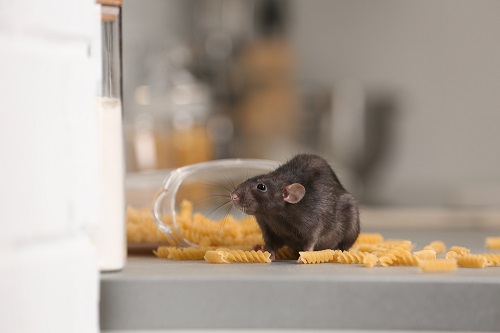
One of the most common reasons for pest control and prevention is rodents and mice. These house pests are more than just signs of filthiness; they are also carriers of deadly diseases.
In fact, the Centers for Disease Control and Prevention reveals that there are more than 35 diseases that rats could easily spread around the house. These include Hepatitis, Salmonella poisoning, Meningitis, and deadly viruses.
Because these diseases are primarily spread and transferred by rodents, the easiest way to protect your family from these deadly diseases is to eliminate and prevent rats and mice from entering and living inside your house. Indeed, effective pest management and prevention methods are necessary not only to keep your house clean and sanitized but also to protect your family’s health.
On the other hand, it is not only spreading diseases that rodents can do. They can also cause damage to your property, particularly by chewing on your walls and furniture. They can also chew through your electrical wires, which can result in fires and structural damage that can be costly and time-consuming.
Effective rodent pest control strategies
Rodents are generally not that difficult to eliminate from your home. You just have to be brave enough to get near them and trap them. Pest management professionals like Zap Pest Control suggest the following easy and effective methods for removing rodents from inside your house.
1. Seal the pests out – The first thing you should do is seal all openings and holes around your house. If you see an opening, you can be sure that this is what those rats and mice use to enter your home. Note that these types of pests can twist and shrink their bodies to fit through even the smallest of holes and openings.
Take a walk around your house and look for gaps, holes, and openings. This can be found on the ground, in your walls, and around your doors and windows. When you see an opening, no matter how big or small it is, you need to seal it tightly. Pest control specialist suggest using a stuffing material that rats and mice do not like. And that is steel wool. Secure the steel wool in the hole by adding caulk. This will also make sure the hole is tightly sealed and that there is no small opening left that mice and rats can chew on to make it bigger and grant them access to your home.
For larger holes and openings, you can use lath screening or metal sheeting. Rats and mice do not like to chew on these materials so these will surely prevent them from entering your home. If you want to completely seal the opening, you can opt to use cement.
2. Keep your house clean – The number one reason why rodents come to your house is that they can sense food sources inside. These can be anywhere throughout the house from a disorganized pantry to spills and crumbs left on the floor and on the counters. Be sure to keep your house clean at all times, especially at night before you go to bed. Keep in mind that rodents like to scour around your house to find food and water during the night when they would least likely be detected.
Start with cleaning your kitchen cabinets, shelves, and counters. Make sure there are no food crumbs and spills left to dry on the shelves and counters. Leftover food should be placed in tightly sealed containers, particularly half-finished bags of chips, and opened bags of cereals, flour, and spices. Enlist the help of the entire family and remind them not to eat or bring food inside their bedrooms. If possible, try not to eat in the living room as well. Restricting food debris and spills in one area of the house – specifically in the kitchen and/or in the dining room – will make it easier for you to keep the house clean and rodent free.
3. Place approved rodent baits – If you suspect or have confirmed rodent presence in your house, you will need to place approved rodent baits all throughout the house. The best areas to place the baits are where they will most likely be hanging around. These are in your kitchen, particularly inside the kitchen cabinets and near the door to your pantry.
Before placing rodent baits, you must ensure that the baits you are using are approved. Seek professional advice from pest control in Myrtle Beach to be sure you are using the right and effective types of bait to use against rodents.
4. Place traps throughout the house – Aside from baits, you can also opt to place traps. These are other great strategy to catch the rodents. While baits will poison and kill the rats, traps catch them instantly. What happens with baits is they bring the poisoned baits to their home where they would eat it with their family, where they would all get poisoned and die at once. The problem with this is that it would be difficult for you to find their hiding place if they die there from eating the poisoned baits. You will know only where they are hiding when they start to rot and smell.
The difference with traps is they instantly get caught inside the cage and you could either bring them to your local pest control center to be disposed of properly or you can call in your pest management company to dispose the trapped rodent and inspect the house for more rodents. You can also use glue traps to trap smaller mice. For larger rats, the best rat trap to use is snap traps. For best results, seek professional advice from the experts.

Myths About Pest Control For Rodents
Rodents have been pestering humans for as long as humans have lived inside structures. There’s something about our homes with all the nooks and crannies that just invite mice and rats to try and come on in to make themselves at home. Annoying! They can show up anywhere from crawl spaces to air ducts to pantry cabinets. They can carry disease and can easily contaminate the food supply in any human’s home. Like anything else, there can be myths that shroud the facts about how to deal with rodents, so let’s dispel some of the more common myths about rodent control….
Myth 1: All you need is a cat to take care of the rodent population.
Fact: Cats do love to hunt and often will get rodents, but they are not always fast enough to combat the escape efforts of the small and fast mice or rats. Cats and dogs could even attract more rodents, and these rodents will often feed right from your pet’s food bowl, leaving them vulnerable to disease.
Myth 2: You can prevent rodents by keeping your home clean.
Fact: Sanitation isn’t enough simply because rodents can survive for a while with no food. Keeping your home clean does make it harder for rodents to come and infest in large numbers, however. Keeping your home clean and sanitized will be very effective when used in combination with bait and other rodent control means. Anything that reduces a food source for rodents will make them easier to control.
Myth 3: Cheese is the best bait to catch mice.
Fact: Cheese can work to draw in rodents, but it’s not nearly as alluring for these pests as film and TV have made it out to be. Seeds or fruit is much more enticing for mice, and many pest control experts will use peanut butter. In dry climates, the best bait for rodents is something moist, as they draw a lot of their water from their food source.
Myth 4: The worst thing a rodent can do is chew.
Fact: They DO chew and as they do, they leave disease and feces, causing danger to humans. While no homeowner wants to think of rodents gnawing and chewing through his house, preventing rodent-borne disease is key when approaching pest control.
Myth 5: Rat poison is the best way to get rid of rodents.
Fact: Rat poison can be very effective for controlling the rodent population, but an even better way is to do a thorough inspection of the small openings in your home and seal them off. That is the single best effective way to have mouse pest control. Also, rat poison is just what the name implies—poison. So if you’re trying to be green or organic in your post control, then this is not the option for you.
Myth 6: You can control rodents by making your own bait.
Fact: Rodent bait of any kind is highly toxic and should be avoided at all costs. Making your own is not a smart thing to do, simply because of the highly poisonous content.
When it comes to pest control in Myrtle Beach and rodents, it’s best to get the help of a professional pest control company. They will know how to set traps and find the rodents and then get rid of them safely and effectively.
Always work with licensed and trained pest control professionals to ensure your house and family are protected from the dangers brought by rodents and other pests. Call Zap Pest Control Inc. now to speak with one of our trained professionals.
Like our Facebook page for more great info about pest control services.
Zap Pest Control Inc.
2507 Forestbrook Rd Suite G
Myrtle Beach, SC 29588
843-654-1927
http://zappests.net/

No comments:
Post a Comment